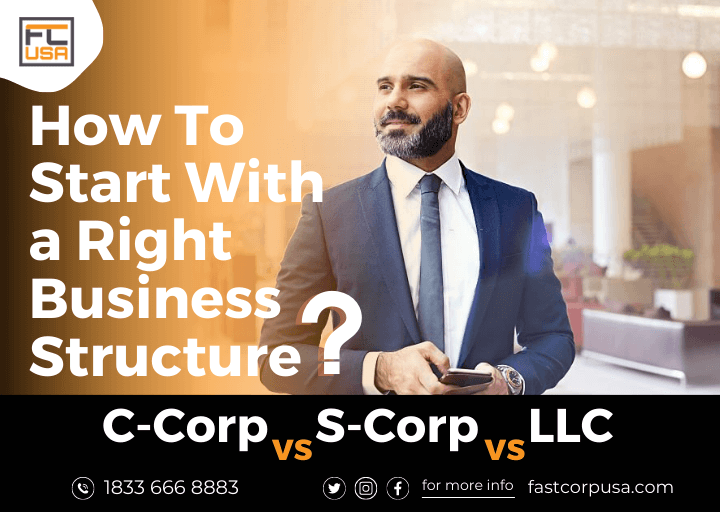Do you ever wonder how the biggest corporations in the world are operating? Well, as a matter of fact, these are based on specific business entities. As an entrepreneur, you must want a liable legal taxation structure for your trade like a C-Corporation (C-Corp). But, as an alternative to C-Corp, you have S-Corp and LLC structures that can meet your business requirements. There are very different types you can incorporate, so it’s better to understand the differences among the three before falling for any one of these. FastCorpUSA will break down the key differences as sometimes it’s become much more daunting to choose the best one. You will learn about the pros and cons of each business type according to the requirements of your business. Let’s dig much deeper for a clear understanding!
C-Corp- An Overview
Undoubtedly, C-Corp is one of the most popular options you can ever use to build your business entity. Building a legal structure will always be a critical decision that can significantly impact your company’s growth, taxation, and liability. Let’s explore the word of C-Corp along with all its formalities and limitations. C-Corp is a business structure recognized by the IRS (International Revenue System) in the United States. This legal entity separated you as an owner from your shareholders. You can raise revenue through public offerings and can have unlimited shareholders.
C-Corp Features
If you go for a C-Corp business, then you can enjoy the following offerings. -Limited liability protection is the fundamental feature of C-Corp. Shareholders get this offer, meaning their personal assets are fully protected from the company’s liabilities and debts. -An eye-catching feature is that it has perpetual existence which means the business continues to exist without a defined end date or expiration. Shareholders will continue to enjoy their existence without depending on the status of their owners. The company will go on even if shareholders pass away or change. -The transfer of ownership seems an easy option and an interesting feature of C-Corp. As a self-employed, C-Corp will be an attractive choice for businesses looking for potential investors for the company’s growth. -The most advanced feature is the raising capital through the issuance of stocks that can be traded publicly. This way, your C-Corp business can attract investors for growth and expansion.
C-Corp Taxation
The C-Corp taxation is a double taxation system that means the profits are taxed while the shareholders are taxed at the individual level. The taxation system may sound like a risk for you to take but C-Corps can reinvest in the company and retain earnings without immediate tax implications.
C-Corp Pros
While considering all the above-mentioned features, you can easily guess what a C-Corp entity will hold for you. Let’s delve into the pros one by one! -The mouthful investment opportunities will always welcome you if you choose C-Corp. In this way, it becomes easier to raise funds for different business operations. -In the business world, C-Corp is known for its higher level of prestige and credibility. Your business needs satisfactory customers and employees and the C-Corp entity is suitable for that. -Employees are the backbone of any organization. Your company can offer much more to its employees in plate through the C-Corp entity such as stock options, retirement plans, retaining top talent, and health insurance. -QSBC (Qualified Small Business Stock) is a US tax code amendment passed in 1993. The amendment allows startup employees, founders, and investors to get the maximum tax benefit from stock holdings. This further covered the C-Corp businesses in 2009. The vast majority ever of business startups are C-Corps. It means that the self-employed of C-Corps are exempt from paying capital gains taxes on stock sales portions as long as these are held for at least five years. This benefit is only specific to C-Corps.
C-Corp Limitations
-Now, this simply occurs because double taxation is the price that C-Corp players pay. For small businesses, this can be a drawback that could not retain significant earnings. -The process could be time-consuming or costly and involves a lot of paperwork. Still, there are companies out there that help you to get out of the whole paperwork fuss such as FastCorpUSA. -C-Corps are always subjected to state regulations and compliances. The conditions also vary from state to state.
C-Corp Business Formation
Is your mind swirling with the questions like how can I get one? Well, if you’re sitting and thinking of forming a C-Corp in the US from any other part of the world such as the UK, Germany, Singapore, or Canada, you’re in the right guidance. You will definitely need a team of consultation for this complex process as this involves taxpayers, advisors, signing articles, and of course lawyers. The starting process is choosing a unique name for your C-Corp business. Later, the legal paperwork involves appointing officers, writing company bylaws, issuing stocks, get business licenses and ID numbers. To avoid all this hassle, choose our platform as we will gladly help you to form the C-Corp of your choice. Contact us at………. As compared to C-Corp, some other business entities are also present in the form of S-Corp and LLC. Let’s review these one by one.
S-Corp- An Overview
When small businesses grow, their business needs also grow with the expansion. These small businesses now see more reliable legal structures that offer flexibility in management, tax advantages, and limited liability. For example, if the growing industries such as corporate services, education, retail, software, and IT, manufacturing plan to expand in the United States, then S-Corp is a popular option for them. In this article, we will try to bring all the possible explanations of S-Corp’s unique features, pros, and obvious cons too.
S-Corp Features
-S-Corp presents a pass-through taxation system that means the company’s profit and losses pass through to its shareholders. The business itself doesn’t pay federal income taxes. Compared to it, C-Corps are subjected to double taxation that is adhered to for the growth of small businesses in the US. -S-Corps allow shareholder restrictions such as the corporations can be held by limited numbers of shareholders. But, if we talk about the C-Corp then these are not limited to any such restrictions and allow foreign investors, individual owners, and even other corporations to be part of the company. This allows greater flexibility and raising capital. -S-Corps come with restricted ownership rules that make the corporation environment challenging for its owners and investors. -S-Corps offer simpler compliance requirements with fewer obligations and formalities.
S-Corp: Pros and Cons
S-Corps save themselves from the hassle of paying federal income tax through the pass-through taxation system. This results in saving taxes. Moreover, it offers limited liability that protects the personal assets of shareholders against business debts and liabilities. The S-Corp structure is based on flexible management as it opts for electing a board of directors for managing the company’s structure. A managerial structure also involves capital access but this is not as efficient as those of C-Corps. However, S-Corps can still attract funds from investors from private sources. The business entity doesn’t only confine to the pros but there are some limitations as well that one can’t ignore. One of the biggest limitations one might wonder is the specific criteria that include shareholders of no more than 100. Being a domestic corporation, the S-Corp could allow only allowable shareholders. In the same way, this also comes with ownership restrictions as well. This means a non-US citizen doesn’t have the right of a shareholder or partnership or choose other corporations as shareholders. In the following, there is also a typical calendar year for tax purposes.
C-Corp VS S-Corp-Tax Implications
As an entrepreneur, you must look into the tax implication system as it follows the exit strategies and long-term business growth. There are financial advisors and tax professionals that can help you to make the most tax-efficient decisions. But, first of all, you must clearly put your business objectives ahead and then think of an entity that gives you the maximum benefit. C-Corp and S-Corp do share similarities when it comes to tax implications. These both pay personal-rate taxes on corporate distributions. When issued by C-Corp, these distributions are referred to as dividends. In both ways, tax implications protect personal assets and corporate liability in the event of litigation. However, in terms of the process, both are also different. C-Corps pay taxes on corporate income and shareholders pay individual taxes. While S-Corp offers pass-through tax treatment. If you want further information, on how these corporations actually work for you, then do not hesitate to contact us directly at….
LLC – An Overview
No one can deny that a Limited Liability Company (LLC) is a flexible and popular business structure. It is a mix of sole proprietorship, corporate and legal partnership. It also provides liability protection to your personal possessions. The LLC involves one or more members like a partnership and requires the business to dissolve when someone leaves. It is also a tax-reporting entity that must file an informational tax number. Each member of the LLC files an individual tax return. When it comes to the features, then an LLC offers a pass-through flexible taxation system. These can also be used as C-corps or S-Corps if it aligns better with the tax strategy and business goals. Moreover, it’s a member-managed business structure in which certain members are designated as managers and process the day-to-day operations.
C-Corp VS S-Corp VS LLC – A Brief Comparison
C-Corps, S-Corps, and LLCs are all common business entities in the United States each with its own pros and cons. In terms of ownership, C-Corps can have an unlimited number of shareholders that can raise funds while S-Corps have a limited number of shareholders. LLC offers much flexibility in this regard and involves various types of members including foreign investors, and corporations. Both C-Corps and S-Corps have a formal organizational structure with shareholders and a board of directors while LLC is a less formal structure. In S-Corps and C-Corps offer more fringe benefits to their employees while LLCs offer some but with limitations compared to corporations. When it comes to raising capital, C-Corps can issue stock and provide a smooth way. While S-Corps and LLC offer capital through other financing methods and member contributions. These corporations can’t issue stock like the C-Corps.
How to convert an LLC into a C corp
If you ever found yourself in a situation where you want to feel like converting to a C-Corp, due to its enormous benefits to entrepreneurs, you are welcome. It’s a complicated process but can be done simply if your business is in the right hand. If you are seeking outside investment or want to issue shares of their company, you can simply turn to a C-Corp. The main procedure to convert is a statutory conversion. The method will involve the state laws where an LLC is registered. A statutory conversion helps you to transfer the LLS’ liabilities and assets to a C-Corp without dissolving the LLC altogether. You can get a conversion plan with the approval from members. It involves a simple statement. Moreover, a certificate of conversion will be prepared with other relevant documents by your state (whatever you’re in) in forming a C-Corp. At FastCorpUSA, you can get free yourself from all boring and time-taking paperwork, and land safely into a C-Corp. Reach out to us at….
Final Thoughts
Now you’re much aware of the key differences between C-Corps, S-Corps, and LLCs. You might stuck in this choice and eliminate any corporation due to its inflexibility. The flexibility for a business only comes when it meets the requirements through a single class of stock. The flexibility of ownership also plays a crucial role. However, the QSBC is the main driving factor for the investors involved in the C-Corp. In the case of early companies, founders often start with an LLC and then convert to C-Corps to meet investor requirements. If you’re also facing mixed thoughts, the platform will gladly provide you with a consultation over the matter of choosing the best corporation structure according to your business needs. Feel Free To Contact Us At Any Time….





0 Comments